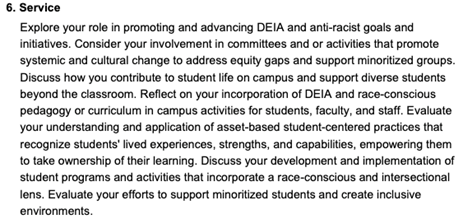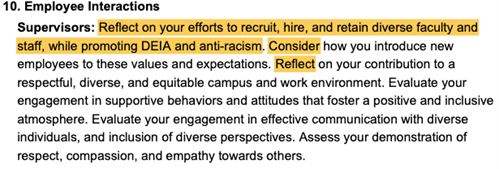
The National Association of Scholars has recently unearthed a revealing document from the Los Angeles Community College District (LACCD): its “diversity, equity, inclusion, and accountability” (DEIA) evaluation form, which details the district’s religious-like dedication to wokeism. Like Catholics in the confessional, all faculty and academic staff must bare their souls for their transgressions against DEIA—“Oh diversity officer, forgive me, for I am racist.”
Part of the Los Angeles Community Community System, LACCD’s DEIA evaluation process resembles a coerced confession, demanding introspection and accountability for one’s past, present, and potential future under DEIA scrutiny. Employees must disclose their “internal biases and behaviors,” ponder the “harm they may have caused to minoritized communities,” and acknowledge how identity shapes “oppression and marginalization.”
Approved for use in October 2023, the LACCD DEIA evaluation process stands out in several key ways.
Firstly, the DEIA evaluation is mandatory.
Secondly, all academic employees, including teaching, staff, advisory, and supervisory positions, are required to undergo DEIA evaluation. When DEIA statement requirements do exist, they are typically limited to tenure-track faculty positions.
Thirdly, the evaluations are for use not just during the hiring process but also during review processes such as tenure and performance reviews, indicating that they are more than simply a form of gatekeeping.
Lastly, the level of introspection required is unique. Typically, DEIA forms are perfunctory. They ask a number of open-ended questions and function as an ideological litmus test. The extreme depth of the LACCD evaluation, where respondents are asked to “reflect,” “evaluate,” and “discuss” several dozen times, reaches the level of spiritual exercise.
The basic elements of traditional religious meditation—delving into one’s past, sifting through aspects of one’s personhood, and making resolutions for future action—are all present.
What differs is simply the evaluative standard. See the first section:

Where the confessional form would typically list venial and mortal sins, the DEIA form inserts oppression and marginalization. Respondents are asked to grapple with the evil of the world and man’s fallibility through a social justice lens and judge their worthiness according to “DEIA and antiracist” standards of righteousness.
The second section grows even more deeply personal:

Respondents are asked about the health and vigor of their DEIA spiritual practices, followed by a summary confession of their past sins and current vices. AA-style, respondents are asked what they have done to make amends, not just for real injustices such as the “equity gap,” but also for possible wrongdoing harm they “may” have caused.
The third section asks faculty to document their conversion story: “Reflect on your journey to promote DEIA and incorporate anti-racist pedagogy.” Commitment to DEIA, as in all faiths, is a primary commitment, both for the Los Angeles Community College District and the California Community College system as a whole. Raison d’etre of these institutions is Ad maiorem DEIA gloriam, not Ad maiorem Dei gloriam.


Evident throughout the document is that not only thought but action to promote DEI is expected. Most benign of the compelled actions include “minoritized student” mentoring and service to “minoritized groups.”

Less benign are the re-education efforts, otherwise known as ‘professional development.’

Of note, supervisors are explicitly told that their role is to recruit ‘diverse faculty and staff’, which is a not-so-subtle endorsement of race-based hiring.

This racist act of contrition fittingly ends the confessional, in which sins are not forgiven but live on in a personnel file in the hands of one’s employers. It should come as no surprise, then, that faculty animus toward DEI statements is ubiquitous.
Last month, Harvard Law School’s Randall Kennedy—a self-described “scholar on the Left committed to struggles for social justice”—described the general sentiment: “It would be hard to overstate the degree to which many academics at Harvard and beyond feel intense and growing resentment against the DEI enterprise because of features that are perhaps most evident in the demand for DEI statements.”
Regardless of thoughts on DEIA, coerced confessions are distasteful. By calling out this practice for what it is, faculty might shift campus opinion to oppose mandatory DEIA statements. Faculty coming out against DEIA statements, such as Randall Kennedy’s op-ed in the Harvard Crimson, do bring about change—Harvard dropped all DEIA statement requirements this week. To roll back such practices, more thoughtful, tactful faculty interventions will need to be made.
Editor’s Note: All screenshots in the article are sourced from records obtained via public records requests.
Photo by DSC_0140 — Wikimedia Commons
If the LACC were to *require* all employees to go on a 5 mile run, all of the related injuries and fatalities would come under the worker’s comp laws, and this would be a large chunk of change coming out of the LACC budget either directly (if they are self insured) or via premium increases if they are not.
Self inquisitions like this have been known to be harmful to psychologically fragile students. It’s been known to push them to suicide, sometimes successfully. The difference with employees is that — unlike with students — the employer is financially liable for any workplace-related injury or illness, regardless of cause or liability.
I can’t find how many employees the LACC has, but with 205,000 students, I’m going to guess 20,500 (10% and I’m probably guessing low). Even 1% of that is 205 individuals — with a cadre of 20,500, they are going to have a lot (thousands) of persons who are psychologically unstable for one reason or another.
Are the DIE bureaucrats prepared and qualified to deal with this?
And beyond that, as they lack the appropriate mental health licenses, how is this not practicing without a license? Aren’t there consequences for that?
And forgetting the ethical aspects, who’s going to pay the financial bill for the inevitable mortality and morbidity? If Larry the lawn mower guy spends six months in the psych hospital, that’s going to be a significant bill, and Larry’s insurance company is going to subrogate it back to the LACC under the worker’s comp laws. If Chelsea the Chemistry Professor commits suicide, there’s going to be a lot of money to support her three children somehow coming out of the LACC.
And then there is the paranoia about another “Virginia Tech Shooter.”
Well, stuff like this CREATES such individuals, and there is considerable evidence that Virginia Tech helped create their shooter which is probably why they still refuse to release certain files that they had on him. If you subject 20,500 people to garbage like this, I’d actually be surprised if you didn’t get some potential violence out of it, and hopefully that would be stopped by law enforcement. If you are lucky, and you aren’t always….